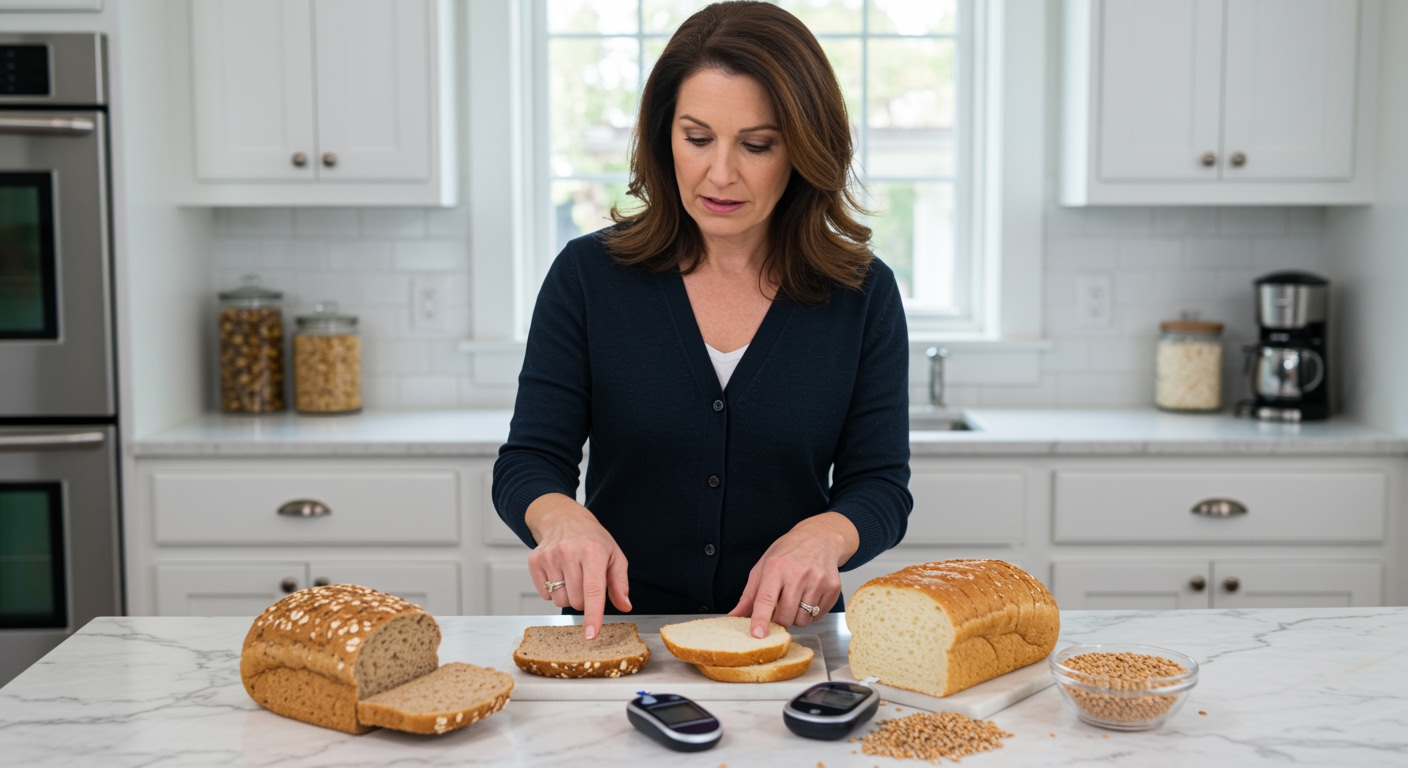✪ Key Takeaway: Whole-grain bread can be good for diabetes when chosen carefully, but processing methods and portion sizes matter more than the grain type.
Introduction
Your doctor told you to switch to whole-grain bread for better blood sugar control.
You might be wondering if this simple swap will actually help manage your diabetes or if you are just fooling yourself with another health myth.
Hi, I am Abdur, your nutrition coach and today I am going to explain exactly how whole-grain bread affects your blood sugar and whether it deserves a place in your diabetic meal plan.
How Does Whole-Grain Bread Affect Blood Sugar?
Whole-grain bread contains the entire wheat kernel including the bran, germ, and endosperm.
This complete structure provides more fiber and nutrients compared to refined white bread.
The fiber in whole grains slows down carbohydrate digestion and glucose absorption in your small intestine.
Research shows that whole-grain bread typically has a lower glycemic index than white bread, ranging from 51-69 compared to white bread at 75.
However, your blood sugar response depends on several factors beyond just the grain type.
The processing method significantly impacts how quickly your body breaks down the carbohydrates into glucose.
Even whole-grain bread can cause blood sugar spikes if the grains are finely ground or if you eat large portions.
✪ Fact: Two slices of whole-grain bread contain approximately 24-30 grams of carbohydrates that will affect your blood sugar.
What Makes Some Whole-Grain Breads Better Than Others?
Not all whole-grain breads are created equal for diabetes management.
The grain processing method plays a crucial role in determining blood sugar impact.
Breads made with coarsely ground grains or intact kernels digest more slowly than those made with finely milled flour.
Stone-ground whole wheat bread typically provides better blood sugar control than commercially processed versions.
The fiber content should be at least 3 grams per slice to provide meaningful blood sugar benefits.
Added ingredients like high fructose corn syrup, honey, or molasses can increase the glycemic impact significantly.
Look for breads where whole grains are the first ingredient and avoid products with multiple types of added sugars.
✪ Pro Tip: Choose breads with visible grain pieces and seeds for slower digestion and better blood sugar control.
How Much Whole-Grain Bread Can Diabetics Eat Safely?
Portion control remains critical even with whole-grain bread choices.
Most diabetes educators recommend limiting bread to 1-2 slices per meal depending on your individual carbohydrate goals.
One slice of whole-grain bread typically contains 12-15 grams of carbohydrates that count toward your daily intake.
Your total daily carbohydrate needs depend on factors like your activity level, medication regimen, and blood sugar targets.
Pairing bread with protein and healthy fats can help slow glucose absorption and reduce blood sugar spikes.
Consider having your bread with meals rather than as standalone snacks for better metabolic response.
Monitor your blood sugar 1-2 hours after eating bread to understand your individual response patterns.
✪ Note: Your medication timing and type may influence how much bread you can include in your meal plan safely.
Are There Better Alternatives To Traditional Whole-Grain Bread?
Several bread alternatives may provide better blood sugar control for diabetics.
Sprouted grain breads often have lower glycemic impact because sprouting reduces starch content and increases protein.
Sourdough whole-grain bread may be easier on blood sugar due to the fermentation process that partially breaks down carbohydrates.
The lactic acid in sourdough can slow starch digestion and improve glucose tolerance.
Low-carb bread options made with almond flour or other alternative flours provide significantly fewer carbohydrates.
Seed-based breads containing flax, chia, or pumpkin seeds offer more fiber and protein with fewer net carbs.
However, these alternatives may not satisfy your desire for traditional bread texture and taste.
✪ Pro Tip: Test different bread alternatives with your glucose meter to find options that work best for your individual metabolism.
The Bottom Line
Whole-grain bread can be part of a healthy diabetic diet when chosen wisely and eaten in appropriate portions.
The key to managing diabetes is not avoiding foods completely but understanding how they affect your body and making informed choices accordingly.
I would love to hear about your experiences with different bread types and how they affect your blood sugar levels, so please share your thoughts and questions in the comments below.
References
At NutritionCrown, we use quality and credible sources to ensure our content is accurate and trustworthy. Below are the sources referenced in creating this article:





